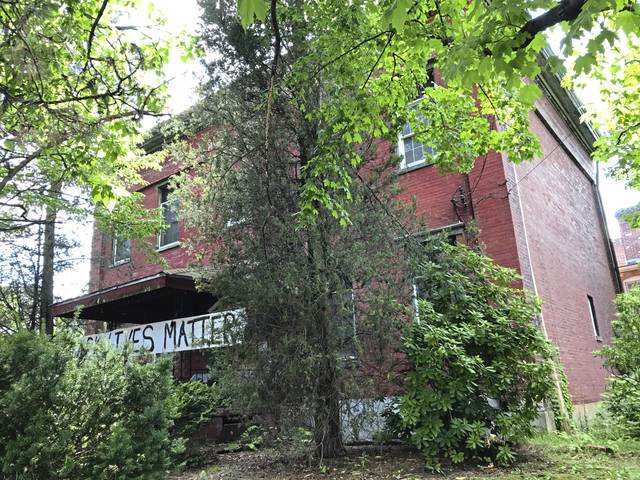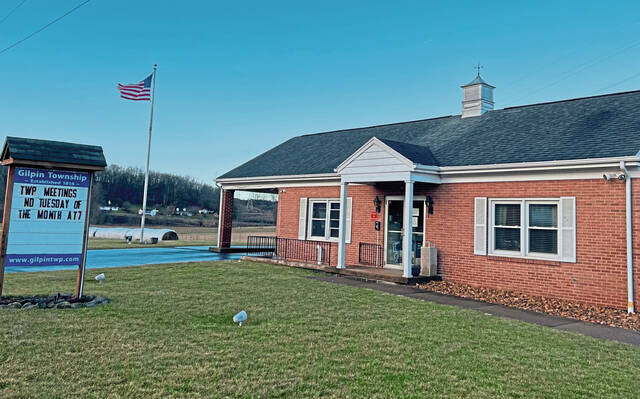The saga of Lawrenceville’s Ewalt House will come to an end Wednesday, when the 186-year-old structure is set to be demolished after a failed effort to designate it as a landmark over owners’ objections.
“Tomorrow when it’s on the ground and not a moment before that, I will probably breathe for the first time in four years,” said Beth Rupert, one of the home’s owners.
Beth and Eric Rupert had inherited the Greek Revival home in 2016 from Eric’s father, George. It was built in 1804 by Samuel Ewalt, an early merchant in Pittsburgh and the first sheriff of Allegheny County.
But the huge house was difficult and expensive for the family – who live in Hampton – to maintain. In October 2019, the Ruperts were ready to demolish the building and sell the property to a developer, Duncan Ventures.
A chain of legal events put the demolition on hold. Keith Cochran, an architect based in Lawrenceville, nominated the house for designation as a landmark. He acted on behalf of the neighborhood preservation group Lawrenceville Stakeholders.
Pittsburgh’s Historical Review Commission and Planning Commission recommended the building receive a historical designation this year. But because the Rupert’s opposed it, six City Council members were required to approve the decision. The council delayed the vote in July, which seemed to work out well for the Stakeholders – but then in August, the bill to make the designation was withdrawn.
The stakeholders group also appealed variances afforded to Duncan Ventures to build five townhouses on the property and was successful. Duncan Ventures has appealed that ruling to the Commonwealth Court.
“The Stakeholders are obviously very concerned and upset about how the process worked out,” said David Toal, an attorney who handled the case on behalf of the Lawrenceville Stakeholders.
With no historical protection and the demo permit renewed, Rupert said the house is coming down on Wednesday.
Rupert described the house as a financial nightmare — a “money pit” — that caused her family stress and anxiety. The building was damaged by a wind burst last August, Rupert said. She described splintered roof braces and interior water damage throughout the house, as well as a bow in a wall that’s leaning in. Rupert fears that if they wait to demolish and snow falls onto the roof, weighing it down, that bowed wall will eventually collapse.
“We’re the ones that are responsible if it falls on someone,” she said. “It’s our liability.”
But advocates for keeping the building say it has historical value. During the legal proceedings, architects Bill and Jill Joyce testified that preservation and reuse of the house was feasible, according to court documents.
The building is also one of the last of its kind in a neighborhood that’s become increasingly popular to developers, Toal said. Housing in Lawrenceville is becoming more expensive, and newer townhomes with front-facing driveways have conflicted with foot traffic and caused parking issues. Keeping the house was part of an effort to preserve the character of the neighborhood.
“A lot of people are losing their ability to live in Lawrenceville because the houses are not affordable anymore,” Toal said. “All that is kind of wrapped into this whole thing. What you’re looking at is losing the historic fabric of the neighborhood, as well as losing any ability for affordable housing.”
Rupert has argued against the historical designation from the beginning. Still, she said Tuesday that she was never against someone buying the house and preserving it.
The family received a $415,000 cash offer for the house last month, Toal said, along with promises to make repairs in the mean time. But Rupert said she isn’t willing to wait for the deal to close. She fears they could back out and leave the family back at square one.
“How long does someone have to wait and go through this turmoil before enough is enough?” she asked. “It’s been four years.”
The Lawrenceville Stakeholders are now in an “unenviable position,” Toal said. They’ve prevailed — so far — in court discouraging the townhouses, but not with the historical designation. Now they fear they could end up with a vacant lot, Toal said.
“The Stakeholders and their constituent members have been committed for years, so obviously it’s very painful for them to see,” he said.








